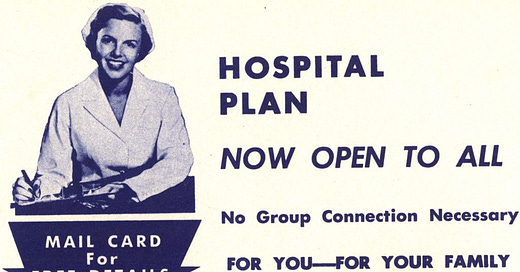If you want to fix healthcare, just stop using your insurance so much
Earlier this month I related our experiences from a long month of illnesses. Part of that saga involved a trip to the emergency room for an eighteen-month-old. Nearly three months later and we are still dealing with bills from that little trip, which comprised about nine hours and a brief and unnecessary admittance to the pediatric ward. We ultimately received three bills totaling a little over $6,000, each from a separate medical entity. This is how hospital care in the U.S. works. Hospitals aren’t just a singular enterprise; they’re composed of multiple different businesses and revenue streams all glommed on to each other, like a Portuguese man o' war, a colonial organism of indeterminate origins. You might go to a hospital in Houston and get bills from businesses in Dallas, Nashville and Peoria. There’s no way to account for any of it. What a fantastically stupid way to run a healthcare system.
Altogether I guess we got off easy. Six grand for nine hours and one admittance is not as bad as it could be. But here’s a little secret: The real bill is actually much lower than that. And you can pay that lower rate if you simply withhold your insurance information and tell the billing agencies you’re going to do “cash pay.”
Case in point: One of our recent hospital bills totaled around $1,800. Before paying it I called up the vendor and asked for an itemized bill to see just what on Earth they could have found to charge that much—a solid-gold EKG machine, maybe, or activated charcoal made from artisanal Hawaiian volcanic rock. While on the phone, the helpful lady asked if we were paying with cash; when I said we were, she asked a few questions about our family situation and then told me we qualified for a 50% bill reduction, payable in interest-free installments over several months. You can’t beat that kind of discount with a stick. I’d dare you to try.
Here is the truth of the matter: The current schematic by which American health care is run—in which we use insurance to pay for everything, up to and including routine visits to the doctor—is impossibly dumb and ruinously expensive. When you utilize a massive paper-laden bureaucracy to help pay for run-of-the-mill medical expenses, it’s going to drive up costs everywhere. Hospitals are going to issue huge bills because they want to overshoot their price points so that insurance companies have a higher ceiling from which to downbid. Medical suppliers are going to overcharge the hospitals because they know the buck will just get passed upwards to insurance companies anyway. Insurance companies raise their rates because they’re paying $215 for you to get an annual physical that should cost $59. This is how it is done.
Cash pay is much easier for hospitals. They like it—it’s why they offer discount incentives. They get the cash in hand at a guaranteed rate, quickly, resolutely, with no haggling over insurance companies and no risk that the price will drop below a sustainable market rate. It’s such a good deal for them that they’re even willing to accept the cash in six-month installments. This is just good economics. It’s really not hard to see why a business would incentivize to such a quick, clean, no-fuss transaction over the frustrating misery of insurance.
Here’s a hypothetical: Imagine most people paid for their groceries in the same way they paid for their healthcare, with third-party insurance that would then haggle endlessly with the grocer in a time-consuming, frustrating, labor-intensive process to bring the reimbursements ever downward. Grocery prices would skyrocket as a result. But obviously if you offered to pay your grocer cash-in-hand, he’d be willing to knock the price down substantially, just to avoid the hassle of insurance and get a set amount of money immediately.
Actually this is a big part of the reason we’re seeing more and more medical establishments refusing to take insurance at all. Many major outpatient surgery centers are increasingly offering price-transparent cash-pay procedures at mere fractions of the cost of hospitals. A newly emergent economy of “direct primary care” doctor’s offices, meanwhile, charge a monthly flat rate for patients, one that pays for itself if you go even just once a month. Cash is always better, especially when you’re seeking non-emergency care.
The endless American healthcare debate generally structures itself along these terms: Critics argue we need to get as many people on as many generous insurance policies as possible, and barring that we need to institute government-run healthcare because otherwise medical care is just too expensive. But of course it’s not too expensive, not ultimately. Healthcare is like any other industry: It pays for them to get paid, and they’re going to want to maximize the least cumbersome, most rapid and most bankable avenues for achieving that, i.e. they want cash, like any normal business.
If we stop using health insurance like some sort of weird angel pay network and instead treat it like the emergency use tool it’s historically been, we’ll see healthcare prices drop expeditiously. The next time you have an unfortunate emergency room visit, be sure to tell them you’ve got a wad of sweaty dollar bills you’re willing to pay them for their troubles. Then watch your bill get cut in half. It can be like this, if we want it!



